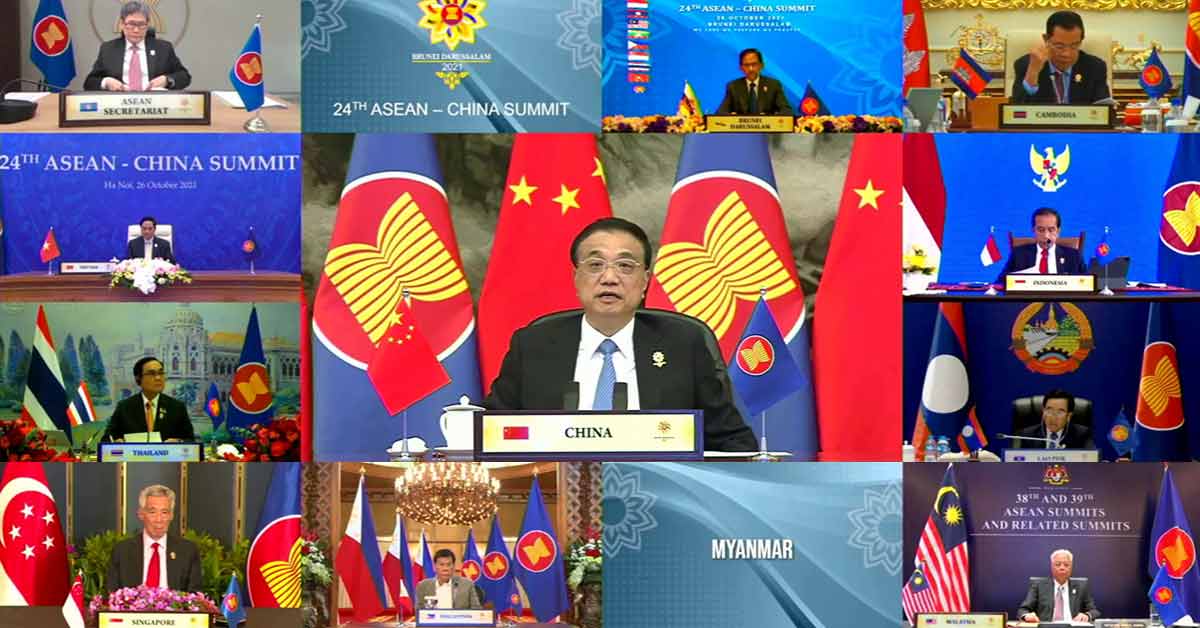This year marks the 30th anniversary of ASEAN-China Dialogue Relations. The two sides, ASEAN and China, have come a long way since the establishment of the ASEAN-China Dialogue Relations in 1991.
To note, the Association of Southeast Asian Nations (ASEAN) is a regional bloc consisting of 10 member states in Southeast Asia, which promotes intergovernmental cooperation and facilitates economic, political, security, military, educational, and socio-cultural integration between member states.
Speaking at the 3rd Manila Forum for Philippines-China Relations with the theme “ASEAN-China Relations and the Role of the Philippines” organised by the Association for Philippines-China Understanding (APCU) and the Embassy of the People’s Republic of China in the Republic of the Philippines on 9 November, 2021, HE Kung Phoak, the former Deputy Secretary-General of ASEAN and the current Secretary of State Ministry of Foreign Affairs and International Cooperation of the Royal Government of Cambodia shared his insights on the ASEAN-China dialogue partnership in its totality.
He expounded on the achievements and key areas which characterised the strong partnership between ASEAN and China in the past three decades including the prospects of a bright future that awaits ASEAN-China Dialogue relations.
According to Kung, on the political security front, one of the defining characteristics of the ASEAN-China partnership is the promotion of peace and stability in the region. He said this is the underlying principle and belief in addressing differences and building the partnership between China and ASEAN.
Another important feature of ASEAN-China relations according to Kung is the belief that multilateralism as opposed to unilateralism, is the right way in managing all the issues that the partnership is faced with.
On the economic front, Kung stated that the partnership between China and ASEAN is in the best form, noting that ASEAN is the largest trading partner of China. But he emphasised that it did not happen overnight but rather is a product of the hard work and persistence of ASEAN and China over the last three decades.
Strategic Opportunities And Partnerships
Likewise, in the last three decades, ASEAN and China have initiated strategic opportunities and have thus far upgraded their dialogue relations to a strategic partnership.
According to Professor Wei Ling of the School of International Relations, at the University of International Business and Economics, in Beijing; China was the first to start Free Trade Agreement (FTA) negotiations with ASEAN and even launched an early harvest program soon after to ensure ASEAN benefitted first, as it regarded ASEAN as a strategic partner.
She also added that in 2002, when ASEAN and China decided to shelve disputes and focus on cooperation on the South China Sea by signing the Declaration on the Conduct of Parties in the South China Sea (DOC), and when China decided not to devalue its RMB to maintain regional financial stability amid the Asian financial crisis, these decisions created strategic opportunities for the initiation of the East Asia-wide regional economic integration. At the same time the two sides created strategic opportunities to facilitate regional peace, growth and community building.
Similarly, speaking at the 3rd Manila Forum, the Ambassador of China to the Philippines, His Excellency Ambassador Huang Xilian, pointed out that over the past 30 years, the giant ship of China-ASEAN friendship and cooperation has always stayed the right course forward.
Huang said that under the strategic guidance of our leaders, China and ASEAN have created the East Asian miracle with joint efforts to find a path of progress in solidarity and win-win cooperation. Over the past 30 years, in the spirit of good-neighbourliness and mutual understanding, the good ambassador emphasised that ASEAN and China have taken the lead in establishing a strategic partnership. This has been exemplified by the growth in trade volume between the two sides by about 85 times, making China and ASEAN the largest trading partners for each other.
Trade and investment cooperation between ASEAN and China has grown rapidly. ASEAN surpassed the European Union (EU) and became China’s largest trading partner in 2020. In addition, over 60 million mutual visits were recorded every year before the COVID-19 pandemic, with more than 200,000 students studying in each other's countries.
Huang also emphasised that despite difficulties, both sides fully implemented the DOC and have advanced negotiations on the COC. Likewise, they have also tackled various challenges including financial crises, natural disasters, and cross-border infectious diseases for regional common development and economic recovery.
Huang further stated in the virtual forum that China has always sees ASEAN as a priority in its neighbourhood diplomacy. He expressed that China has been firmly supporting the unity of ASEAN and ASEAN Community building, and upholding ASEAN Centrality in regional architecture. China has made unremitting efforts to promote common development and prosperity as well as peace and stability in the region.
The Role Of The Philippines
Huang also recognised the important role the Philippines has played as a facilitator and contributor in promoting ASEAN-China relations.
According to the Chinese ambassador to the Philippines, in the past three years, the Philippines, as country coordinator, has played a particularly active and important role, bringing China-ASEAN relations to a historic high while laying a solid foundation and drawing a blueprint for the future development of China-ASEAN Strategic Partnership.
For instance, ASEAN-China adopted the China-ASEAN Strategic Partnership Vision 2030 and Plan of Action to Implement the Joint Declaration on China-ASEAN Strategic Partnership for Peace and Prosperity (2021-2025).
Speaking at the same forum, Undersecretary Ma. Theresa P. Lazaro, the current Undersecretary for Bilateral Relations and ASEAN Affairs of the Department of Foreign Affairs (DFA), similarly elucidated more on the role of the Philippines in advancing the exemplary relations of ASEAN and China and the notable achievements of ASEAN-China Dialogue Relations under the Philippines’ co-ordinator-ship for the past three years.
According to Lazaro, when the Philippines assumed the country co-ordinator-ship of the dialogue relations from August 2018 to August 2021, with close coordination with China, the country was able to make the most out of the negative COVID-19 situation and still got a few things done.
Some of the most prominent achievements of the Philippines co-ordinator-ship included the very first meeting of ASEAN on COVID-19 pandemic response – the Special ASEAN-China Foreign Ministers’ Meeting on the Coronavirus Disease 2019 (COVID-19) – which was held with China in February 2020 in Vientiane, Lao. The meeting highlighted the mutual assistance between ASEAN member states and China.
Another achievement of the Philippines co-ordinator-ship according to Usec. Lazaro was the role of the Philippines in advancing peace in the South China Sea. The Philippines as country coordinator of ASEAN-China relations for the past three years was the co-chair with China on the negotiations on the Code of Conduct in the South China Sea (COC).
The Philippines played an important role in chairing and guiding the discussions on the COC. Usec. Lazaro pointed out that the Philippine team, led by many of her colleagues in the Department of Foreign Affairs (DFA), were instrumental in streamlining the text of the COC, reorganising and reclassifying the text, and spearheading discussions on the important issues that will define the success of the COC negotiations.
Without a doubt, the Philippines has made important contributions in the promotion of ASEAN-China relations in the last three years as coordinator.
Future Prospects
Henceforth, after three decades, the ASEAN-China Dialogue Relations has paved the way for a stronger strategic partnership between ASEAN and China. As President Xi Jinping pointed out, “The China-ASEAN relationship has grown into the most successful and vibrant model for cooperation in the Asia-Pacific and an exemplary effort in building a community with a shared future for mankind”.
Similarly, APCU Chairman Emeritus and Former President Gloria Macapagal Arroyo also speaking at the 3rd Manila Forum, highlighted that ASEAN will continue to have a productive relationship with China in the years to come.
She also specified that ASEAN has likewise benefited when China became an economic powerhouse with the investments it has poured into the region over the past three decades. “Today, China is on the cusp of becoming the largest economy in the world and we can expect beneficial effects on the economies of its neighbours in the region especially ASEAN,” she said.
Kung also purported that ASEAN-China relations have a promising outlook especially in the areas of trade, infrastructure, and investments while setting the bar for global collaboration and mutually beneficial ties to build more cooperation in the areas of green and digital economies, technological advancement, and sustainable development, as the two sides step-up their relationship to a comprehensive strategic partnership.
Conclusion
In retrospect, ASEAN-China relations during the past three decades, despite many challenges has delivered tangible benefits to the peoples of ASEAN and China. This in many ways could be attributed to the dependability, faithfulness, and steadfast commitment of both sides.
Indisputably, over the past 30 years, through thick and thin, both ASEAN and China have recognised the importance of maintaining open-minded, rational, friendly, and mutually beneficial relations and cooperation.
The views expressed in this article are the author’s own and do not necessarily reflect those of The ASEAN Post.

